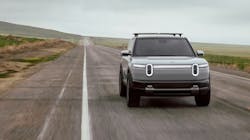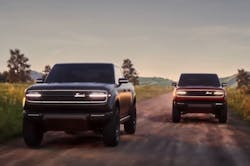EV Notes: Rivian Grows More Confident in R2’s Unit Economics
Executives of Rivian Automotive Inc. are growing more confident they will be able to meet their two-pronged goal of cutting in half the cost of the company’s R2 mid-sized sport-utility vehicle versus its first-generation cars and of having R2s make money by the end of next year.
Speaking after Rivian reported its third-quarter results on Nov. 4, Chairman and CEO R.J. Scaringe told analysts and investors his team’s decision—made before President Trump formally launched his tariff push—to prioritize parts produced domestically or under the umbrella of the USMCA trade agreement is paying off when it comes to the R2’s bill of materials.
“These contractual agreements that we have on the BOM itself help really give us confidence in us achieving the BOM and us ultimately getting to […] R2 positive unit economics at the exit of 2026,” Scaringe said on a conference call.
Also contributing are two factors related to more recent Trump tariff policies: Last month’s extension through 2030 of an offset worth 3.75% of a vehicle’s suggested retail price “is very helpful for us,” Scaringe said. And other tariff tweaks mean that Rivian’s costs related to the trade war are now “a few hundred dollars” per vehicle versus management’s initial estimate of several thousand.
“It’s a pretty significant shift for us,” Scaringe added.
Rivian remains on track to start R2 production of up to 155,000 units annually in the first half of next year at its factory in Normal, Illinois. Ramping that work will be key to closing in on profitability: Rivian will this year post an adjusted EBITDA loss of $2 billion to $2.5 billion and deliveries of about 42,000 vehicles.
Scout picks North Carolina for HQ
The leaders of Scout Motors Inc., the Volkswagen AG subsidiary preparing to launch the brand that made its name more than half a century ago, have picked a development east of downtown Charlotte to be their U.S. headquarters as they prepare for a 2027 production start in relatively nearby Blythewood, South Carolina.
The move is expected to bring 1,200 jobs to Charlotte in the next five years and pay an average wage of $172,000, Scout officials said earlier this month. Those people will add to a North Carolina automotive sector that economic-development leaders say has grown by nearly a quarter since 2014.
In its heyday, Scout was part of International Harvester. Volkswagen leaders acquired the trademark four years ago and plan to build both electric and hybrid Terra trucks and Travelers SUVs. The cars’ entry-model price is forecast to be below $60,000 when they come to market.
Autonomous electric truck company plans SPAC deal
In what feels like a bit of a throwback to 2021, executives of autonomous electric trucks venture Einride AB recently said they plan to merge the company into Legato Merger Corp. III, a special-purpose acquisition company.
The two entities’ plans call for 9-year-old Einride, which counts GE Appliances among its roughly two dozen customers and is today booking $45 million in annualized revenues, to also raise another $100 million before completing its Legato merger. The SPAC transaction is scheduled to be completed by the middle of next year.
For more on Einride’s plans (as well as the first quarterly report from fellow autonomous trucking venture Kodiak AI), visit our fellow EndeavorB2B brand FleetOwner.
About the Author
Geert De Lombaerde
Senior Editor
A native of Belgium, Geert De Lombaerde has been in business journalism since the mid-1990s and writes about public companies, markets and economic trends for Endeavor Business Media publications, focusing on IndustryWeek, FleetOwner, Oil & Gas Journal, T&D World and Healthcare Innovation. He also curates the twice-monthly Market Moves Strategy newsletter that showcases Endeavor stories on strategy, leadership and investment and contributes to other Market Moves newsletters.
With a degree in journalism from the University of Missouri, he began his reporting career at the Business Courier in Cincinnati in 1997, initially covering retail and the courts before shifting to banking, insurance and investing. He later was managing editor and editor of the Nashville Business Journal before being named editor of the Nashville Post in early 2008. He led a team that helped grow the Post's online traffic more than fivefold before joining Endeavor in September 2021.

